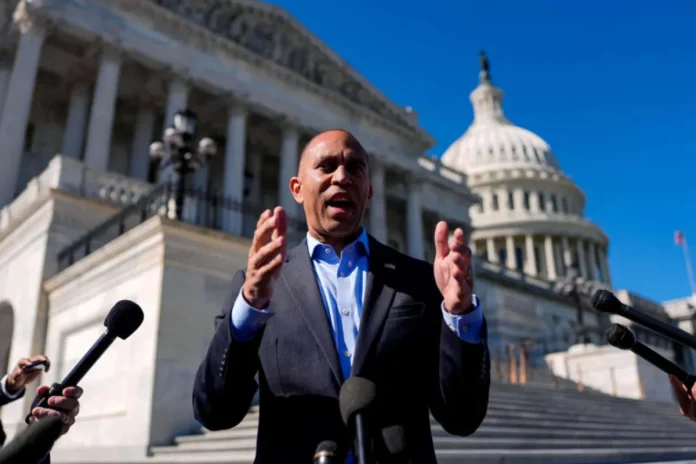WASHINGTON – Two weeks into a government shutdown with no clear end in sight, political tensions in Washington are reaching new heights. Lawmakers from both major parties are visibly frustrated, as the standoff continues to affect millions of Americans.
This week at the U.S. Capitol, two Democratic senators confronted House Speaker Mike Johnson outside his office, accusing him of “covering up for pedophiles” by avoiding a vote to release more details on the late convicted sex offender Jeffrey Epstein.
On the same day, the Democratic House Minority Leader, Hakeem Jeffries, told a Republican congressman to “keep your mouth shut” during a heated exchange over expiring health insurance subsidies. These confrontations highlight the growing bitterness between Democrats and Republicans as the first government shutdown in seven years stretches toward its third week.
No Progress in Congress
Lawmakers are showing little effort to resolve the impasse publicly. The House of Representatives has not conducted a vote in more than three weeks, while the Senate has yet to resume work on weekends since the fiscal year ended on September 30.
The stakes of the shutdown are becoming increasingly urgent. On Wednesday, October 15, military personnel will miss their first paycheck since the shutdown began. Funding for a major food assistance program, relied upon by millions of mothers and infants, is likely to run out in the coming days. Key economic data needed to calculate Social Security payments for over 70 million Americans next year also remains stalled.
Senate Majority Leader John Thune (R-SD) recently pointed to a poster of Senate Minority Leader Chuck Schumer (D-NY) during a press conference on October 10, underscoring the ongoing deadlock. Congress’s failure to reach a funding agreement last week means the government remains closed, prolonging uncertainty for Americans nationwide.
Mounting Pressure on Lawmakers
Lawmakers themselves are feeling the pressure. Speaker Mike Johnson, R-Louisiana, said, “I’m trying to muster every ounce of Christian charity that I can” while dealing with the Democrats. Rep. Jimmy Gomez, D-California, described the situation as “bare knuckles in this fight.”
The tensions were particularly visible on October 8, when Democratic Senators Ruben Gallego and Mark Kelly confronted Speaker Johnson over his refusal to swear in newly elected Democratic Representative Adelita Grijalva from Arizona. Once sworn in, she would likely deliver the crucial vote needed to push forward a measure forcing the Justice Department to release additional Epstein files.
Johnson denied any connection to the Epstein case, stating, “This has nothing to do with Epstein.” Gallego responded sharply, accusing him of making excuses, as nearby staffers, reporters, and security watched the intense exchange. Video footage of the confrontation quickly went viral online.
The following day, Johnson faced additional criticism during a C-SPAN call-in segment. One caller, a military spouse from northern Virginia, warned him that her “kids could die” if service members continued to go unpaid.
Shouting Matches and Political Firestorms
The same day, House Minority Leader Hakeem Jeffries clashed with Republican Rep. Mike Lawler over expiring health insurance subsidies. Lawler urged support for a one-year extension, while Jeffries snapped, “Why don’t you just keep your mouth shut?” The confrontation drew onlookers, many filming the encounter, which later went viral.
President Donald Trump also commented on the shutdown during a Cabinet meeting, taking aim at Democratic leadership. “We really don’t know who the hell is leading the Democrats,” he remarked.
Glimmers of Bipartisanship
Despite the acrimony, small signs of bipartisanship remain. Senators from both parties continue limited conversations behind the scenes about a potential health care deal that could help reopen the government. Senator Markwayne Mullin, R-Oklahoma, described the negotiations as “stalled,” while Senator Ruben Gallego acknowledged that some Republicans are genuinely looking for a resolution.
The government shutdown continues to disrupt daily life for millions, making bipartisan cooperation more crucial than ever. Americans are watching closely as Congress struggles to find a way forward, hoping that lawmakers can set aside partisan differences before the consequences worsen.
Also Read: Government Shutdown 2025: Live Updates on Social Security, Flights, Furloughs, and Federal Workers

